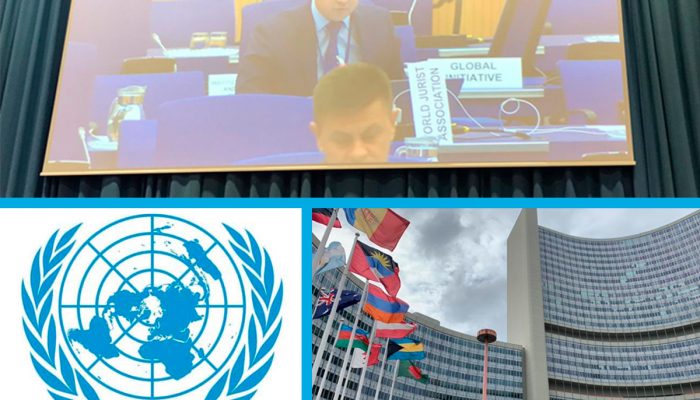The World Jurist Association made a presentation at the United Nations Vienna, during the plenary session of the Conference of States Parties to the United Nations Convention against Corruption on September 2-4, 2020. The conference was chaired by the Attorney General of the United Arab Emirates, Harib Saeed Al Amimi, and Gabriel Fernández Rojas, WJA Representative to the UN Vienna and Financial Coordinator of the World Law Congress, participated on behalf of the World Jurist Association.
During his speech, Mr. Fernández Rojas mentioned the commitment of WJA in the fight against corruption and assured that the rule of law is incompatible with corruption. He stressed that a rule of law capable of preventing corruption is needed, in order to guarantee human rights and freedom, as well as to promote cohesion between societies. Additionally, he pointed out that the balance of power must be optimized, ensuring the efficiency and neutrality of public administrations, as well as improving citizens’ trust in institutions. In conclusion, he recognized that in a global context, open to new challenges and opportunities, the fight against corruption is one of the most urgent ways to defend the rule of law and remarked that this will only be possible with a strong commitment from society.
On the occasion of this meeting, the UN Economic and Social Council (ECOSOC) also met, and as NGO with special consultative status before this institution, the World Jurist Association participated in it.
In the framework of the different events in Vienna, the WJA future activities were promoted in one to one meetings, increasing its network within this key forum.
The most important meeting was limited to UN State Parties and accredited NGOs. During that event, participants shared the progress made by their country in the fight against corruption, in light of the upcoming General Assembly against Corruption (UNGAS) to be celebrated in June 2021. One of the issues that caught greatest attention was the initiative presented in 2019, coincidentally, by the Government of Colombia at the UN New York. Colombia proposed the creation of an international court specialized in fighting against corruption and transnational corruption, in order to overcome limitations such as those that became visible with the Odebrecht case, the existence of blatant money laundering issues from the highest governmental levels in some countries, and the impossibility of making justice owing lack of judicial independence.

